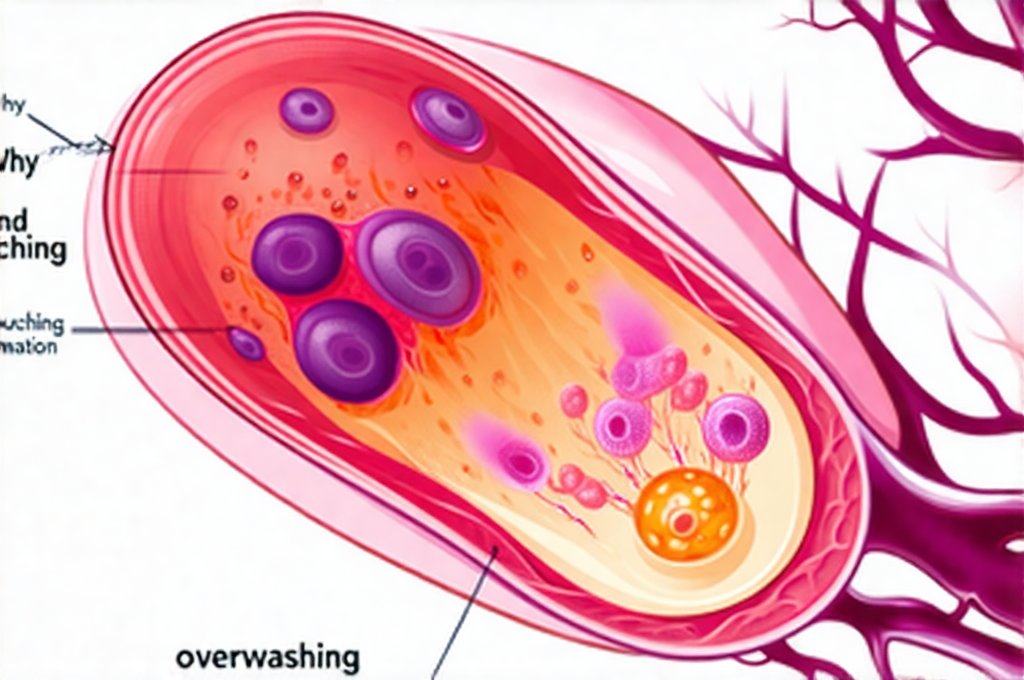The delicate balance within our urinary system is often taken for granted until disruption occurs. Many factors can contribute to urinary inflammation – from infections to autoimmune conditions – but increasingly, everyday hygiene practices are being recognized as potential triggers. While maintaining cleanliness is vital, overzealous cleaning and the use of harsh products can inadvertently disrupt the natural microbiome and protective barriers of the urethra and surrounding tissues, leading to irritation and inflammation. This isn’t simply about avoiding ‘bad’ bacteria; it’s about preserving the beneficial flora that actively protect against harmful invaders and maintain urinary tract health.
The misconception often lies in equating cleanliness with sterility. Our bodies are ecosystems, teeming with microorganisms – many of which are essential for proper function. The urinary tract is no exception. A healthy vaginal microbiome (in individuals with vaginas) plays a crucial role in preventing ascending infections that can affect the bladder and kidneys. Similarly, even in those without vaginas, the natural flora around the urethral opening contributes to defense mechanisms. Douching or excessive washing disrupts this delicate balance, stripping away protective bacteria and creating an environment where pathogens can flourish. This disruption doesn’t just impact women; anyone can experience urinary inflammation from altering their natural microbiome through aggressive hygiene practices. If you find your pain is worsening at night, it might be helpful to understand why urinary pain can be worse in the evening.
The Disruptive Nature of Douching & Overwashing
Douching, the practice of flushing the vaginal cavity with water or other solutions, is demonstrably linked to a higher risk of bacterial vaginosis (BV), yeast infections, and pelvic inflammatory disease (PID). These conditions can then escalate into urinary tract issues. Even if BV isn’t present initially, douching actively creates an environment conducive to its development by removing the protective lactobacilli that maintain a healthy vaginal pH. This disruption weakens the natural defenses against ascending pathogens, increasing the likelihood of urinary tract infections (UTIs). The same principle applies, albeit less directly, to overwashing external genitalia – even with mild soaps – as it can still strip away beneficial bacteria and disrupt the skin’s protective barrier.
The impact extends beyond simply removing ‘good’ bacteria. Many douches contain harsh chemicals like fragrances, dyes, and preservatives that are inherently irritating to the delicate tissues of the vagina and urethra. These irritants trigger inflammation directly, compromising the integrity of the mucosal lining and making it more susceptible to infection. Similarly, overly frequent washing with strong soaps can disrupt the natural lipid layer of the skin around the urethral opening, reducing its ability to act as a barrier against pathogens. It’s a vicious cycle: disruption leads to inflammation, which further weakens defenses, creating a greater need for…more disruptive cleaning.
The misconception that douching promotes hygiene is particularly damaging. The vagina is self-cleaning; it naturally maintains a healthy environment through its own mechanisms. Introducing external fluids disrupts this natural process and often does more harm than good. For individuals without vaginas, the focus should be on gentle cleansing of the genital area with water alone, or very mild, fragrance-free soap if desired – always avoiding harsh chemicals or aggressive scrubbing. Understanding can douching lead to bladder infections? can help inform your hygiene habits.
The Microbiome & Urinary Tract Health
The urinary microbiome, while less extensively studied than the gut or vaginal microbiome, is increasingly recognized as a critical component of overall health. It’s not a sterile environment; a diverse community of bacteria resides within the bladder and urethra, contributing to immune function and protection against pathogens. This microbiome is influenced by a multitude of factors, including genetics, diet, hydration, and – crucially – hygiene practices. Douching and overwashing significantly alter this microbial landscape, reducing diversity and favoring the growth of opportunistic pathogens.
A healthy urinary microbiome acts as a first line of defense, competing with harmful bacteria for resources and producing antimicrobial substances that inhibit their growth. When disrupted, the balance shifts, creating an environment where UTIs are more likely to occur. Furthermore, chronic inflammation caused by repeated disruptions can lead to long-term changes in the bladder lining, increasing the risk of interstitial cystitis – a chronic condition characterized by persistent bladder pain and discomfort. Maintaining microbiome diversity is therefore essential for preventing urinary tract issues and promoting overall health.
Understanding Urethral Irritation & Inflammation
Urethral inflammation, or urethritis, can manifest as a range of symptoms including painful urination (dysuria), frequent urge to urinate, discharge from the urethra, and pain in the pelvic area. While often associated with sexually transmitted infections (STIs) or bacterial infections, non-infectious causes are becoming increasingly recognized – and hygiene practices play a significant role. Harsh soaps, fragrances found in feminine hygiene products, and even certain laundry detergents can all irritate the delicate urethral lining, triggering inflammation.
The urethra is particularly vulnerable because its mucosal membrane is thin and sensitive. Repeated exposure to irritants compromises this protective barrier, leading to micro-tears and increased permeability. This allows pathogens to more easily penetrate the tissue, causing infection or exacerbating existing inflammation. Avoiding harsh chemicals and opting for gentle cleansing with water is paramount in preventing urethritis. If you find that UTI pain can feel worse after sitting, adjusting your routine might help alleviate discomfort.
Hydration & Its Protective Role
Adequate hydration is a cornerstone of urinary tract health and plays a crucial role in flushing out bacteria and reducing inflammation. When dehydrated, urine becomes more concentrated, creating an ideal environment for bacterial growth and increasing the risk of UTIs. Furthermore, insufficient fluid intake can lead to decreased bladder capacity and increased irritation of the urethral lining.
The recommended daily water intake varies depending on individual factors such as activity level, climate, and overall health, but generally aiming for eight glasses (64 ounces) per day is a good starting point. Beyond water, incorporating hydrating foods like fruits and vegetables can also contribute to overall fluid balance. Proper hydration helps dilute urine, reducing bacterial concentration, and supports the natural flushing mechanisms of the urinary tract, minimizing inflammation and promoting healthy function.
Gentle Cleansing Practices for Optimal Health
The key takeaway is gentleness. Avoid douching altogether, as it offers no health benefits and carries significant risks. For external genital hygiene, prioritize water-based cleansing over soap whenever possible. If using soap, choose a mild, fragrance-free option specifically formulated for sensitive skin.
Here are some practical steps to promote urinary tract health through gentle cleansing:
- Water is best: Cleanse the external genitalia with plain water as your primary method of hygiene.
- Avoid harsh chemicals: Steer clear of products containing fragrances, dyes, parabens, sulfates, or other irritating ingredients.
- Gentle wiping: After using the toilet, wipe from front to back (for those with vaginas) to prevent bacterial contamination.
- Cotton underwear: Opt for breathable cotton underwear to minimize moisture and reduce the risk of irritation.
- Hydrate consistently: Drink adequate amounts of water throughout the day to maintain urine dilution and support flushing mechanisms.
By prioritizing gentle cleansing practices, maintaining adequate hydration, and respecting the natural microbiome of the urinary tract, we can significantly reduce the risk of inflammation and promote long-term health. Remember, a healthy urinary system isn’t about sterile cleanliness; it’s about harmonious balance. For women experiencing changes during perimenopause, understanding can perimenopause trigger bladder issues is important for proactive health management.





















